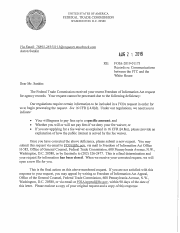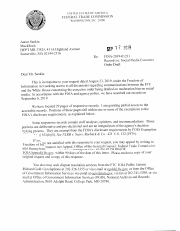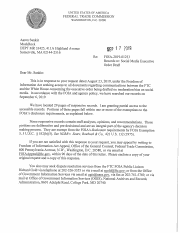Communications With White House On Social Media Executive Order . (Federal Trade Commission)
| Tracking # |
FOIA-2019-01233 |
| Multi Request | Communications With White House On Social Media Executive Order . |
| Submitted | Aug. 12, 2019 |
MuckRock users can file, duplicate, track, and share public records requests like this one. Learn more.
Communications
From: Aaron Sankin
To Whom It May Concern:
Pursuant to the Freedom of Information Act, I hereby request the following records:
I am a reporter with The Markup. I am seeking all documents and records regarding communications between the your agency and the White House about the executive order being drafted by the Trump administration on moderation bias on social media.
Here is an article about the executive order: https://www.politico.com/story/2019/08/07/white-house-tech-censorship-1639051
I seek all responsive records regardless of format, medium, or physical characteristics. In conducting your search, please understand the term “communications” in its broadest sense, to include any written, typed, recorded, graphic, printed, or audio material. I seek records of any kind, including electronic records, audiotapes, videotapes, and photographs, as well as letters, emails, facsimiles, telephone messages, voice mail messages and transcripts, notes, or minutes of any meetings, telephone conversations or discussions. Our request includes any attachments to these records. No category of material should be omitted from search, collection, and production.
Please limit your search to dates between January 1, 2019 and the date when your search for responsive records is carried out.
You may not exclude searches of files or emails in the personal custody of your officials, such as personal email accounts. Records of official business conducted using unofficial systems or stored outside of official files is subject to the Federal Records Act and FOIA. It is not adequate to rely on policies and procedures that require officials to move such information to official systems within a certain period of time; I have a right to records contained in those files even if material has not yet been moved to official systems or if officials have, through negligence or willfulness, failed to meet their obligations. If any potentially responsive records have been destroyed and/or transferred to other agencies or offices, such as the National Archives and Records Agency (NARA), then I request copies of the destruction or transfer slips as well as any other documentation relating to, mentioning or describing said transfer or destruction, to include but not be limited to confirmation that your agency has no other copies of said records.
In addition, please note that in conducting a “reasonable search” as required by law, you must employ the most up-to-date technologies and tools available, in addition to searches by individual custodians likely to have responsive information. Recent technology may have rendered your agency's prior FOIA practices unreasonable. In light of the government-wide requirements to manage information electronically by the end of 2016, it is no longer reasonable to rely exclusively on custodian-driven searches.
Furthermore, agencies that have adopted the NARA Capstone program, or similar policies, now maintain emails in a form that is reasonably likely to be more complete than individual custodians’ files. For example, a custodian may have deleted a responsive email from his or her email program, but the your agency's archiving tools would capture that email under Capstone.
Accordingly, I insist that you use the most up-to-date technologies to search for responsive information and take steps to ensure that the most complete repositories of information are searched.
Under the FOIA Improvement Act of 2016, agencies must adopt a presumption of disclosure, withholding information “only if . . . disclosure would harm an interest protected by an exemption” or “disclosure is prohibited by law.”
If it is your position that any portion of the requested records is exempt from disclosure, I request that you provide an index of those documents as required under Vaughn v. Rosen, 484 F.2d 820 (D.C. Cir. 1973), cert. denied, 415 U.S. 977 (1974). As you are aware, a Vaughn index must describe each document claimed as exempt with sufficient specificity “to permit a reasoned judgment as to whether the material is actually exempt under FOIA.” Moreover, the Vaughn index “must describe each document or portion thereof withheld, and for each withholding it must discuss the consequences of disclosing the sought-after information.” Further, “the withholding agency must supply ‘a relatively detailed justification, specifically identifying the reasons why a particular exemption is relevant and correlating those claims with the particular part of a withheld document to which they apply.’”
In the event some portions of the requested records are properly exempt from disclosure, please disclose any reasonably segregable nonexempt portions of the requested records. If it is your position that a document contains non-exempt segments, but that those non-exempt segments are so dispersed throughout the document as to make segregation impossible, please state what portion of the document is non-exempt, and how the material is dispersed throughout the document. Claims of non-segregability must be made with the same degree of detail as required for claims of exemptions in a Vaughn index. If a request is denied in whole, please state specifically that it is not reasonable to segregate portions of the record for release.
Please institute a preservation hold on information responsive to this request.
As a member of the media, I am seeing dissemination of this information to the general public and am requesting a waiver of fees.
Please be aware that under 5 U.S.C. § 552(a)(6)(A), a FOIA request is considered constructively denied after twenty business days and is subject to litigation on that basis. If my request is denied in whole or part, I ask that you justify all deletions by reference to specific exemptions of the act. As the law requires, I will also expect you to release all segregable portions of otherwise exempt exempt material.
I reserve the right to appeal your decision to withhold any information or to deny a waiver of fees.
I request you expedite the processing of this request. We certify to be true and correct to the best of our knowledge and belief, that there is an urgent need to inform the public about the federal government activity that is the subject of this request.
Expedited processing is to be granted under the federal statute “in cases in which the person requesting the records demonstrates a compelling need” or “in other cases determined by the agency.” As defined by statute, “compelling need” means that (a) “failure to obtain requested records on an expedited basis Expedited processing is to be granted under the federal statute “in cases in which the person requesting the records demonstrates a compelling need” or “in other cases determined by the agency.” As defined by statute, “compelling need” means that (a) “failure to obtain requested records on an expedited basis under this paragraph could reasonably be expected to pose an imminent threat to the life or physical safety of an individual”; or (b) “with respect to a request made by a person primarily engaged in disseminating information, urgency to inform the public concerning actual or alleged Federal Government activity.”
This request meets category (b) cited above, since the issue os social media regulation is being hotly debated and it essential the public be informed about how the process of crafting this executive order as soon as possible, since it would have a dramatic effect on nearly ever aspect of American life.
In 2013, the D.C. Circuit court noted that “courts have found a ‘compelling need’ to exist when the subject matter of the request was central to a pressing issue of the day.” The Court noted that “[i]n cases where compelling need was found, plaintiff’s cited numerous articles and reporters, including many in mainstream news sources such as the New York Times, the Washington Post, the Los Angeles Times, and/or the San Francisco Chronicle.”
The courts found that the issue of news coverage is especially critical to courts in determining whether a “compelling need” exists for expedited FOIA processing, asserting, for example, that the “ultimate conclusion” with regards to expedited processing relies on important underlying facts, such as “the credibility of a claimant’s allegations regarding government activity, the existence of a threat to physical safety, or whether an issue is the subject of news coverage.”
I submit that the responsive records are central to ongoing news coverage at a wide variety of local and national media outlets, thus constituting a matter of a current exigency to the American public. Below is a sample of this recent coverage:
https://qz.com/1685704/trump-draft-order-targets-anti-conservative-social-media/
https://gizmodo.com/the-white-house-readies-draft-of-executive-order-that-c-1837110097
Thank you for your prompt attention this request.
The requested documents will be made available to the general public, and this request is not being made for commercial purposes.
In the event that there are fees, I would be grateful if you would inform me of the total charges in advance of fulfilling my request. I would prefer the request filled electronically, by e-mail attachment if available or CD-ROM if not.
Thank you in advance for your anticipated cooperation in this matter. I look forward to receiving your response to this request within 20 business days, as the statute requires.
Sincerely,
Aaron Sankin
From: Federal Trade Commission
Hello,
Thank you for submitting your Freedom of Information Act (FOIA) request to the Federal Trade Commission (FTC). Someone from our office will reach out to you as soon as possible regarding the status of your request.
Sincerely,
The FTC FOIA Unit
From: Federal Trade Commission
Dear Mr. Sankin,
Please see the attached document regarding your FOIA request.
Edison Thompson
Government Information Specialist
Office of the General Counsel
Federal Trade Commission
600 Pennsylvania Ave., NW
Washington, DC 20580
(202) 326-2965 (T)
[pic]
-

image001
From: Aaron Sankin
Thank you for your request for clarification.
I am applying for a fee waiver. I am a member of the media, an investigative reporter with a nonprofit news outlet called The Markup (https://themarkup.org). All documents obtained as part of this FOIA will be used as part disseminating information to the public.
If the fee waiver is not granted, I am willing to pay up to $100 in document retrieval and reproduction costs.
Thanks!
From: Federal Trade Commission
A cover letter granting the request and outlining any exempted materials, if any.
From: Federal Trade Commission
Dear Mr. Sankin,
Please see the attached documents regarding your FOIA request.
Edison Thompson
Government Information Specialist
Office of the General Counsel
Federal Trade Commission
600 Pennsylvania Ave., NW
Washington, DC 20580
(202) 326-2965 (T)
[pic]
Files
pages




